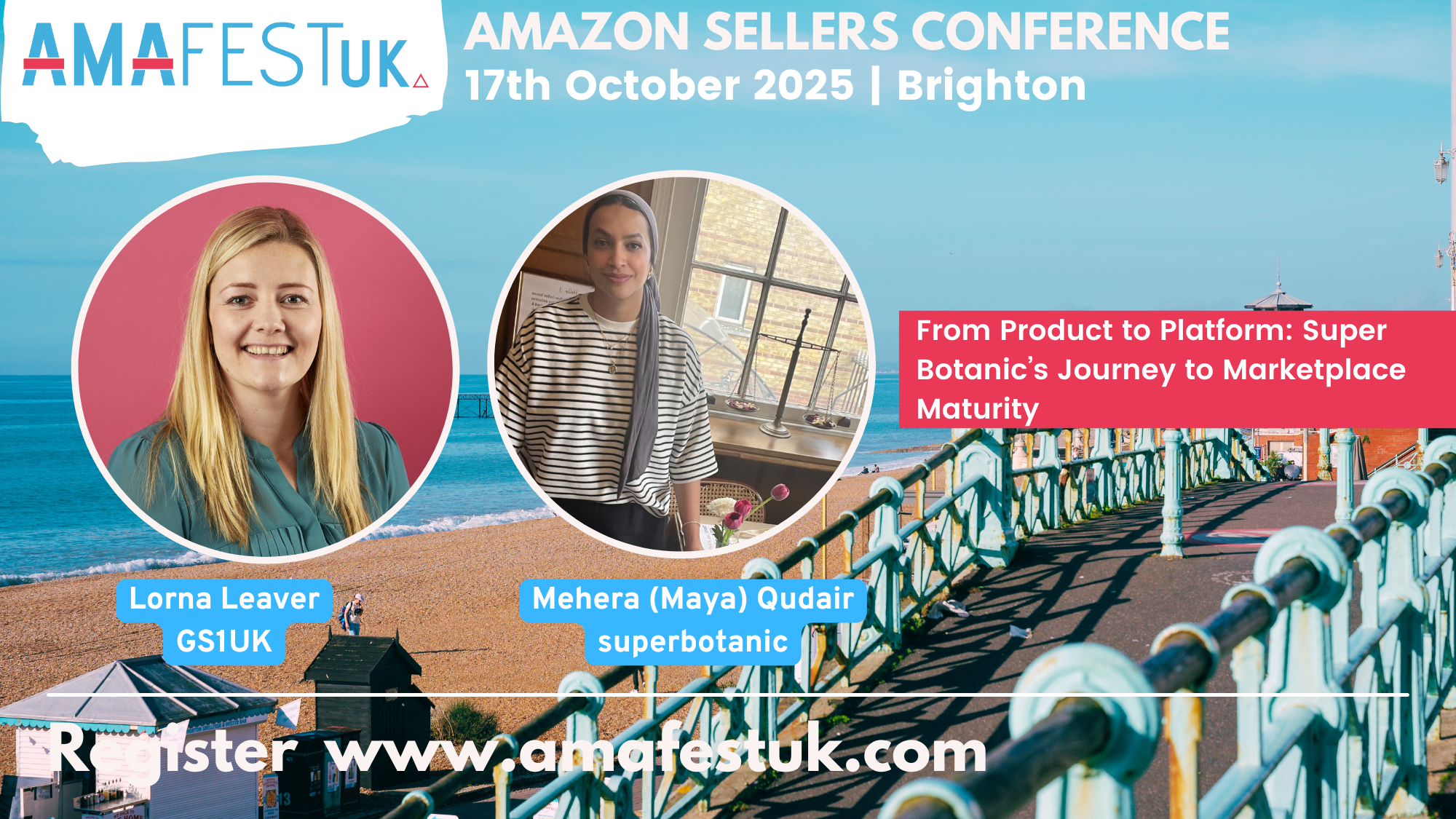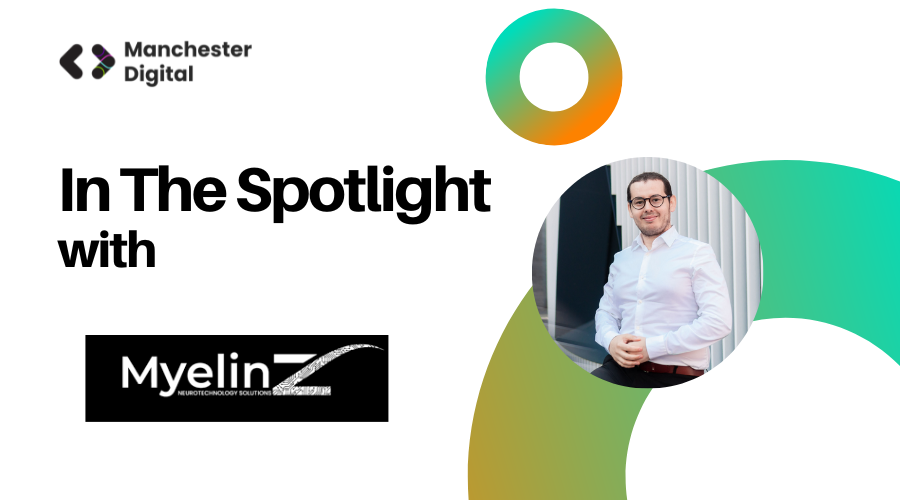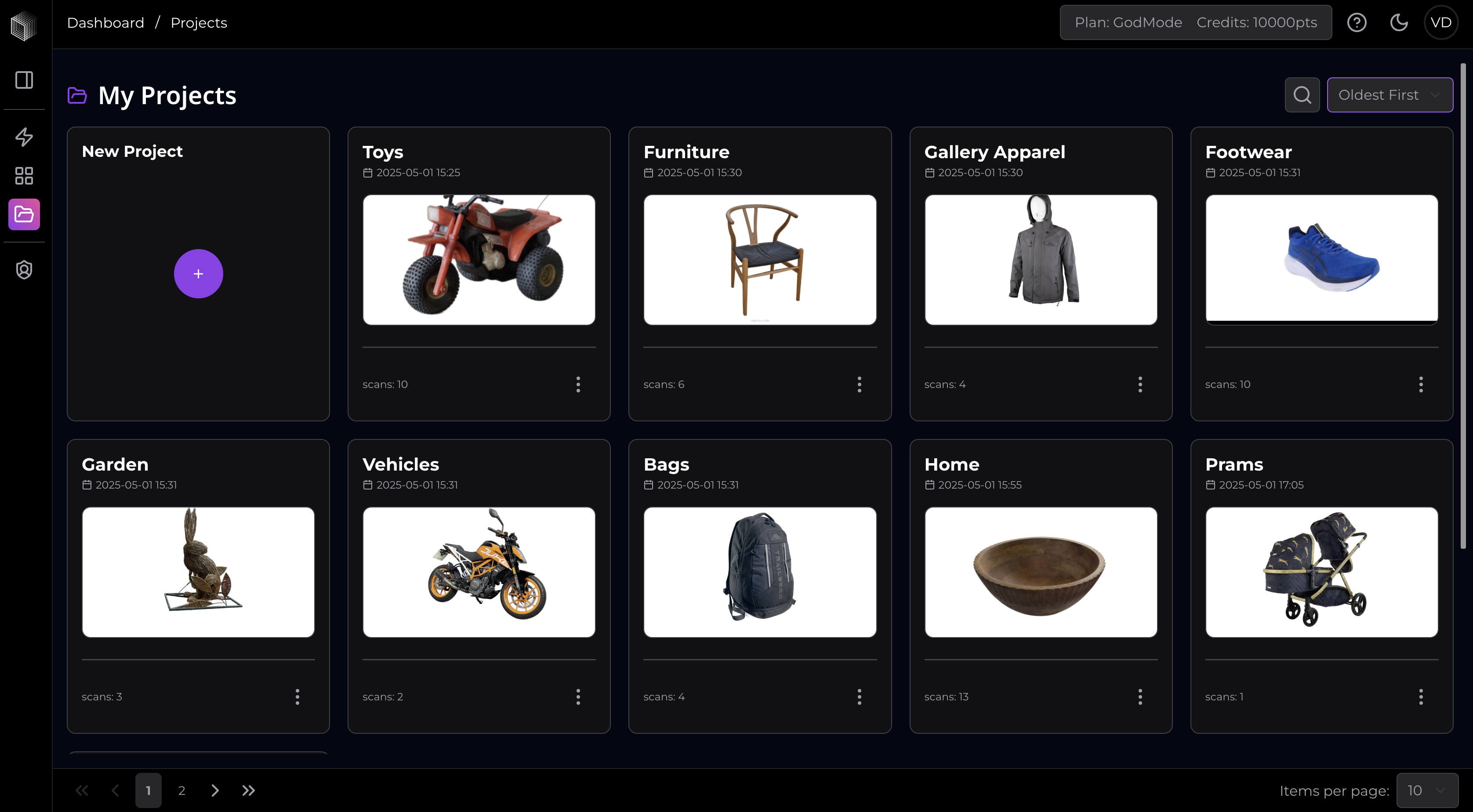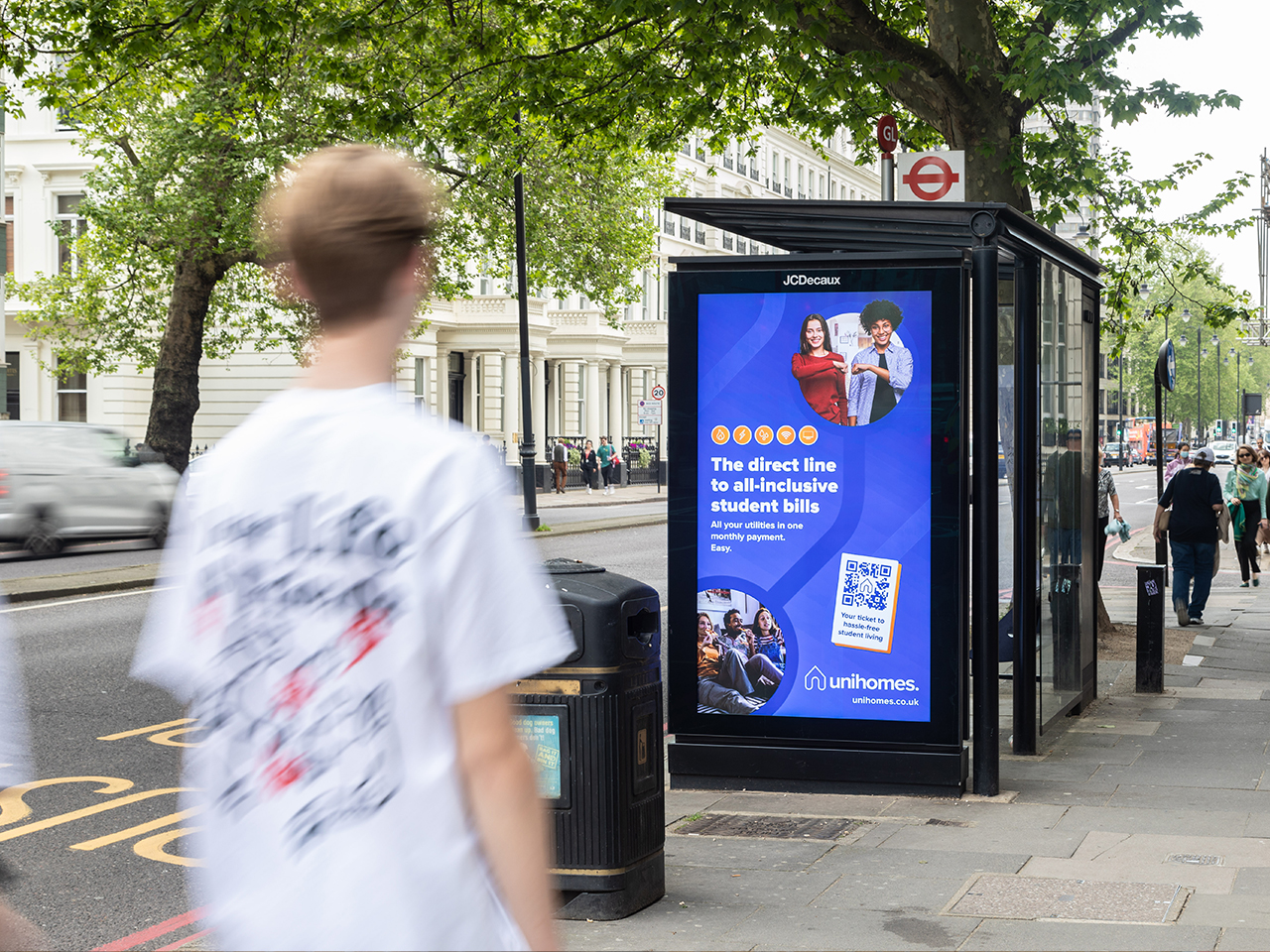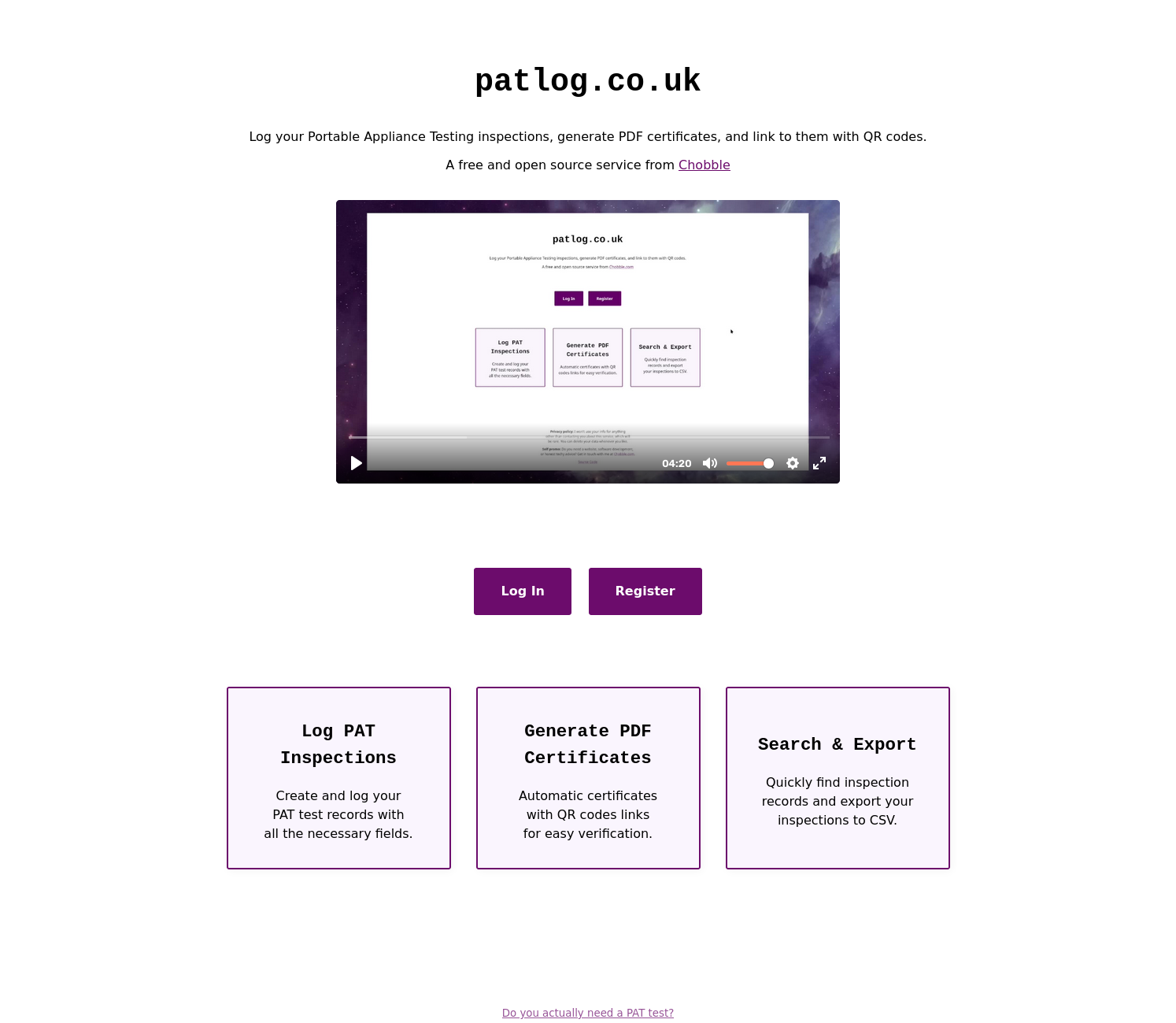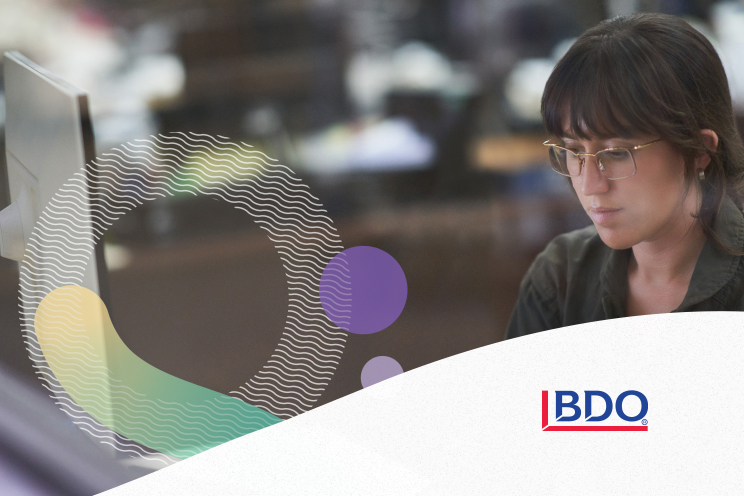Our members frequently tell us they’re struggling to hire developers.
As the trade body for progressive tech and digital businesses, one of our key roles is to help address the skills shortage – which is why we’re helping our members to become part of the solution by opting to develop their own talent pipeline through our Digital Future Stars Level Four Software Developer Apprenticeship – a programme that’s been co-designed and co-delivered by developers from within our membership – meaning that apprentices receive cutting-edge technical training whilst gaining vital professional skills too.
As such, we’re delighted to introduce you to Amber Garland, one of our Digital Future Stars Apprentices. Amber has recently completed the programme, earning herself a distinction and also joining her apprenticeship employer, Co-op Digital as a full-time member of staff.
Of Amber’s fantastic achievement, Ben Mitchell, our Learning and Development Coach said “It’s great to see Amber’s progression – her achievements provide a shining example of what our Digital Future Stars Software Developer Apprenticeship is all about. Having come into our programme with a passion for software engineering and an appetite for learning, Amber’s natural talents have been built upon by the expertise and mentorship offered via our programme and we now wish Amber all the best in what promises to be a long and happy career at Co-op Digital”
For now, we thought we’d catch up with Amber herself, and Charles Morley, Co-op Digital’s Digital Talent Analyst at Co-op Digital to find out what they have to say about the benefits of taking part in the Digital Future Stars Level Four Software Developer Apprenticeship
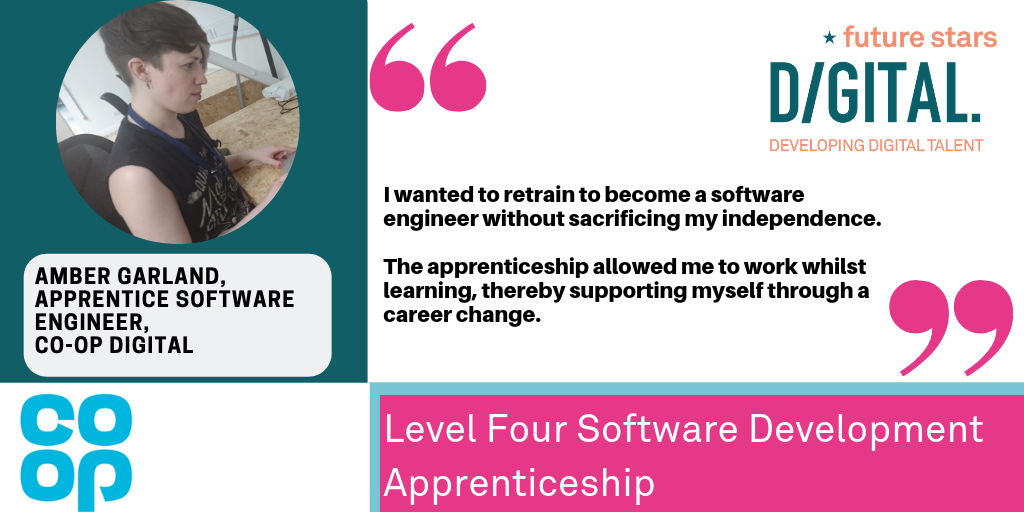
So Amber, what was it that made you want to take part in the apprenticeship programme?
I wanted to retrain to become a software engineer without sacrificing my independence. The apprenticeship allowed me to work whilst learning, thereby supporting myself through a career change.
Could you describe your background and where your passion for coding came from?
I'd studied mathematics at university and had mostly worked temporary jobs in the administration. I enjoyed automating certain processes to save office time where I could, and in my spare time, I took an online course about making games where I learnt the basics of C#, some facets of object-oriented programming, and practices such as test-driven development. I really enjoyed learning about these things and found myself researching new concepts when they were mentioned.
We want to know about your experience on the apprenticeship. What do you make of the programme? Was it what you expected? If not, what surprised you?
The main strength of the apprenticeship, in my opinion, is its flexibility in the programming language, learning styles, and even details such as when certain exams are taken. I was surprised at the freedom this permitted me with regards to scheduling my personal study, which took up 20% of my work week. I was able to study alone from books, videos, and personal projects, or with others. As someone with an anxiety disorder, I believe this flexibility played a key part in alleviating some of the stresses I'd felt during previous experiences in education, contributing to my success. I was also particularly happy to be able to work for a company I hold in such high regard where I felt supported through my struggles.
While I entered the programme ready to embrace the opportunity without many fixed expectations, I was surprised at the breadth of subjects covered and the vast amount I've learned about many different roles within the industry. I particularly value the experience of working on different teams where I was able to see Agile methodologies personalised to suit the specific project.
Now that you’re no longer an apprentice, you must feel that you’ve come a long way. Could you talk us through the journey and explain how the programme helped you along the way?
When I started the apprenticeship, I had a basic understanding of C# that I'd hoped would help my acquisition of Java, the language used on my team at Co-op Digital, as they are both object-oriented languages.
Before beginning my role in the office, the programme provided a four-week intensive training bootcamp for the entire cohort to attend where I bonded with the other apprentices. While it didn't always go to plan, Manchester Digital was responsive to feedback. The experience brought us together and I think we all learned the value of retrospectives and feedback in these few weeks! We were exposed to the basics of object-oriented languages, design patterns, and some of the agile methodology practices we were likely to be practising in our day to day jobs as apprentices. The training also helped me feel confident that my C# skills would transfer to Java (which is now my primary language).
During the first few months of my placement, I felt overwhelmed by all the things I was learning and would have to learn; not just the technical parts of the craft but also how to work within the industry. The daily work routine in a supportive environment provided a reliable structure while I was constantly exposed to concepts and phrases I'd never heard of before. I knew I'd be able to ask someone any questions I had at the next stand-up meeting, for example, or when pair programming on a ticket with another developer. I began to feel more confident as I noticed I was gradually understanding more and more of what was being discussed in meetings.
In the next chapter of the placement, I focused on getting the Java qualification through Oracle. My workplace provided a textbook and past paper program to study. I met with other apprentices for group study, studied independently on my study days, and even answered practice questions at work between tickets or when my pairing partner was busy. I was in frequent contact with the programme Development Coach about booking the exam and my requirements, they helped connect me with others who had taken it the previous year and who knew what to expect from the venue. I still remember the feeling of accomplishment and relief when I got my passing grade! Meanwhile, during this time I moved to a new team working on a project I was interested in and was able to participate in opportunities at work that boosted my confidence in my capabilities even further.
The second half of the apprenticeship felt much more fast-paced as I selected write-ups for my portfolio and undertook a personal project to ensure that I would be prepared for the final exam. The monthly boot camps in the programme helped some of my questions and provided exposure to tools I might not have encountered otherwise. Again, I moved to another team where I'd be able to work using a new tech stack I had only used in personal projects and was excited to explore further.
I also revised for the methodology exam, asking lots of questions to the programme Development Coach (and I mean a LOT) before settling on a date to sit the exam alongside others from my cohort in the final quarter of the apprenticeship. I then booked the synoptic exam and submitted my portfolio which covered a variety of pieces of work I'd done over the course of the apprenticeship. Which brings me to now, having passed the exams and received my grade, I'm progressing as a Junior Developer with Co-op Digital.
Could you give a particular example of something you learned on the apprenticeship that you now use in your job?
From day one with the course I was exposed to Agile practices such as retrospectives and stand-ups that are a fundamental part of how many teams in the industry function, including the team I am with currently. Besides the basics of the programming language I use in my job, I also learnt how best to apply the properties of object-oriented languages, the SOLID principles, primarily serving to enhance extensibility, simplicity, and efficiency. The importance of these principles become clear when working on any shared codebase as I do.
I also learned how to adapt from working and communicating as a group in a team, for example in meetings and planning sessions, to working as a pair within a larger team and even to occasionally working alone as part of a team.
Do you feel the scheme increased your employability, confidence and readiness to be a part of a professional team?
Definitely. I now have a vast range of experiences with different technologies and project styles and feel confident in my abilities to delve into these even deeper, and even to learn new things.
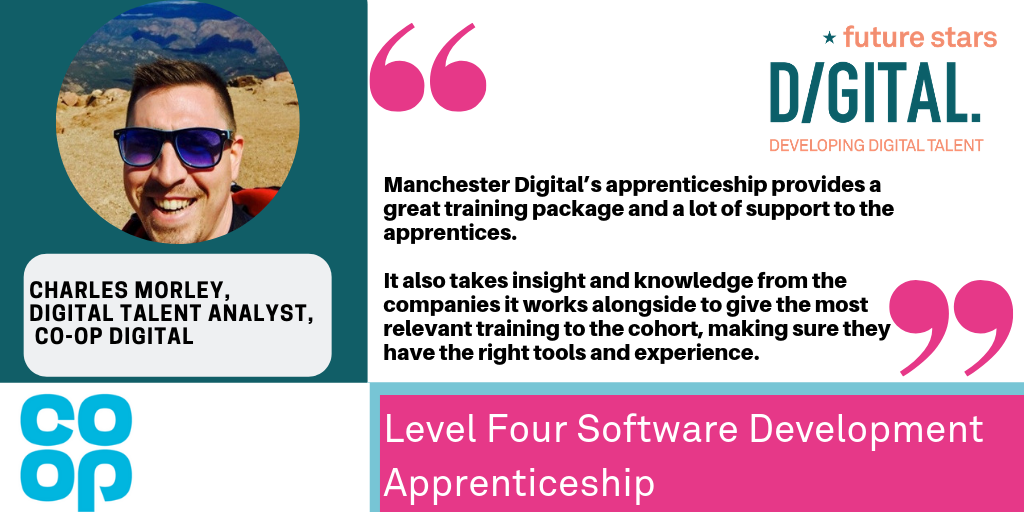 We also caught up with Charles Morley of Co-op Digital to hear their thoughts on our apprenticeship.
We also caught up with Charles Morley of Co-op Digital to hear their thoughts on our apprenticeship.
What made you want to back our apprenticeship programme?
For Co-op Digital to support the Manchester Digital apprenticeship programme was an obvious choice. With our main offices in Manchester, we were looking for someone local and someone in touch with the local community to be able to support us. Manchester Digital is also very focused on diversity which is very key for us. We are passionate about looking for individuals from different backgrounds to bring different perspectives and experience to the product teams and our business. They also offer support outside of the programme to help us, as a business, make informed choices given market information and insight in the tech industry.
What do you look for in an apprentice?
In an apprentice, we’re looking for someone who is passionate about the tech industry, and in software development. Some experience is obviously beneficial but the main factor for us is the attitude. We want someone to bring something new to the team and something exciting, which all of our apprentices have so far. As a business, we also provide products and services that help people and communities so this key for us in who we take on. We look for someone who is of a similar mindset, that they want to do the right thing for our users and for the community, in turn helping out business.
How would you describe Manchester Digital’s role in supporting and developing the progression of your apprentice?
Manchester Digital’s apprenticeship provides a great training package and a lot of support to the apprentices throughout their time. It takes insight and knowledge from the companies that it works alongside to give the most relevant training to the cohort, making sure they have the right tools and experience.
What advice would you give to a company considering hiring an apprentice?
I’d say to any business its a no brainer, why wouldn’t you want an apprentice? It's definitely a time investment from the team that will be supporting the individual once they’ve joined, so make sure you’re prepared for that, but the benefit far outweighs it. We’ve had some fantastic people through the programme, but it's also helped people in the teams to better their technical skills, and coaching and mentoring abilities, allowing them to progress their own careers. My main advice is to make sure you have the right people in your business at the moment to be able to support them, and think carefully about who is going to help the apprentice once they’re with you. Not just from a technical perspective but a personal one as well. It can have a huge impact.
Want to be a part of the Digital Future Stars Level Four Software Developer Apprenticeship?
If you would like to know more either from a learner’s perspective or as a business that would like to hire from the programme then get in touch with Ben Mitchell, our Learning and Development Coach.
